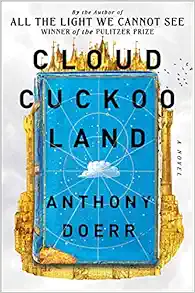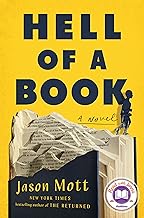"The National Book Awards were established in 1950 to celebrate the best writing in America. Since 1989, they have been overseen by the National Book Foundation, a nonprofit organization whose mission is to celebrate the best literature in America, expand its audience, and ensure that books have a prominent place in American culture. Although other categories have been recognized in the past, the Awards currently honors the best Fiction, Nonfiction, Poetry, Translated Literature, and Young People’s Literature published each year." - https://www.nationalbook.org/awards-prizes/national-book-awards-2021/
FICTION:
Cloud Cuckoo Land: a novel by Doerr, Anthony
Set in Constantinople in the fifteenth century, in a small town in present-day Idaho, and on an interstellar ship, decades from now, Anthony Doerr's gorgeous third novel is a triumph of imagination and compassion, a soaring story about children on the cusp of adulthood in worlds in peril, who find resilience, hope--and a book. In Cloud Cuckoo Land, Doerr has created a magnificent tapestry of times and places that reflect our vast interconnectedness--with other species, with each other, with those who lived before us, and with those who will be here after we're gone.
"Cast out of the royal court by Eleanor of Aquitaine, deemed too coarse
and rough-hewn for marriage or courtly life, seventeen-year-old Marie de
France is sent to England to be the new prioress of an impoverished
abbey, its nuns on the brink of starvation and beset by disease. At
first, taken aback by the severity of her new life, Marie finds focus and
love in collective life with her singular and mercurial sisters. In
this crucible, Marie steadily supplants her desire for family, for her
homeland, for the passions of her youth with something new to her:
devotion to her sisters, and a conviction in her own divine visions.
Marie, born the last in a long line of women warriors and crusaders, is
determined to chart a bold new course for the women she now leads and
protects. But in a world that is shifting and corroding in frightening
ways, one that can never reconcile itself with her existence, will the
sheer force of Marie's vision be bulwark enough? Equally alive to the
sacred and the profane, Matrix gathers currents of violence, sensuality,
and religious ecstasy in a mesmerizing portrait of consuming passion,
aberrant faith, and a woman that history moves both through and around.
Lauren Groff's new novel, her first since Fates and Furies, is a defiant
and timely exploration of the raw power of female creativity in a
corrupted world"--. Provided by publisher.
"Isaiah was Samuel's and Samuel was Isaiah's. In the barn they tended to the animals, but also to each other, transforming the hollowed-out shed into a place of human refuge, a source of intimacy and hope in a world ruled by vicious masters. When an older fellow slave seeks to gain favor by preaching the master's gospel on the plantation, the enslaved begin to turn on their own. Isaiah and Samuel's love, which was once so simple, is seen as sinful and a clear danger to the plantation's harmony. -- adapted from jacket"
Soot, a young Black boy, lives in a rural town in the recent past. The Kid, a possibly imaginary child appears to a Black author on a cross-country publicity tour to promote his bestselling novel. As their stories build and converge, they astonish. As the nation reckons with a tragic police shooting playing over and over again on the news, what it can mean to be Black in America? Who has been killed? Who is The Kid? Will the author finish his book tour, and what kind of world will he leave behind? -- adapted from jacket.
NONFICTION:
"An immersive tale of the killing of a Native American man and its far-reaching consequences for Colonial America. In the summer of 1722, on the eve of a conference between the Five Nations of the Iroquois and British-American colonists, two colonial fur traders brutally attacked an Indigenous hunter in colonial Pennsylvania. The crime set the entire mid-Atlantic on edge, with many believing that war was imminent. Frantic efforts to resolve the case created a contest between Native American forms of justice, centered on community, forgiveness, and reparations, and an ideology of harsh reprisal, based on British law, that called for the killers' execution. In a stunning narrative history based on painstaking original research, acclaimed historian Nicole Eustace reconstructs the crime and its aftermath, taking us into the worlds of Euro-Americans and Indigenous peoples in this formative period. A feat of reclamation evoking Laurel Thatcher Ulrich's A Midwife's Tale and Alan Taylor's William Cooper's Town, Eustace's utterly absorbing account provides a new understanding of Indigenous forms of justice, with lessons for our era"--. Provided by publisher.
"Sitting in the Smithsonian's National Museum of African American History and Culture is a rough cotton bag, called "Ashley's Sack," embroidered with just a handful of words that evoke a sweeping family story of loss and of love passed down through generations. In 1850s South Carolina, just before nine-year-old Ashley was sold, her mother, Rose, gave her a sack filled with just a few things as a token of her love. Decades later, Ashley's granddaughter, Ruth, embroidered this history on the bag--including Rose's message that "It be filled with my Love always." Historian Tiya Miles carefully follows faint archival traces back to Charleston to find Rose in the kitchen where she may have packed the sack for Ashley. From Rose's last resourceful gift to her daughter, Miles then follows the paths their lives and the lives of so many like them took to write a unique, innovative history of the lived experience of slavery in the United States. The contents of the sack--a tattered dress, handfuls of pecans, a braid of hair, "my Love always"--Speak volumes and open up a window on Rose and Ashley's world. As she follows Ashley's journey, Miles metaphorically "unpacks" the sack, deepening its emotional resonance and revealing the meanings and significance of everything it contained. These include the story of enslaved labor's role in the cotton trade and apparel crafts and the rougher cotton "negro cloth" that was left for enslaved people to wear; the role of the pecan in nutrition, survival, and southern culture; the significance of hair to Black women and of locks of hair in the nineteenth century; and an exploration of Black mothers' love and the place of emotion in history"--. Provided by publisher
YOUNG PEOPLE'S LITERATURE:
"Aware of the racial tumult in the years after the passage of the Chinese Exclusion Act, Mei tries to remain blissfully focused on her job, her close friendship with the camp foreman's daughter, and telling stories about Paul Bunyan--reinvented as Po Pan Yin (Auntie Po), an elderly Chinese matriarch"--. Provided by publisher
"Seventeen-year-old Lily Hu can't remember exactly when the question took root, but the answer was in full bloom the moment she and Kathleen Miller walked under the flashing neon sign of a lesbian bar called the Telegraph Club. America in 1954 is not a safe place for two girls to fall in love, especially not in Chinatown. Red-Scare paranoia threatens everyone, including Chinese Americans like Lily. With deportation looming over her father--despite his hard-won citizenship--Lily and Kath risk everything to let their love see the light of day"-- Provided by publisher.
It's the summer before middle school and eleven-year-old Bug's best friend Moira has decided the two of them need to use the next few months to prepare. For Moira, this means figuring out the right clothes to wear, learning how to put on makeup, and deciding which boys are cuter in their yearbook photos than in real life. But none of this is all that appealing to Bug, who doesn't particularly want to spend more time trying to understand how to be a girl. Besides, there's something more important to worry about: a ghost is haunting Bug's eerie old house in rural Vermont...and maybe haunting Bug in particular. As Bug begins to untangle the mystery of who this ghost is and what they're trying to say, an altogether different truth comes to light--Bug is transgender.
Moth, who lost her family in an accident, and Sani, who is battling ongoing depression, take a road trip that has them chasing ghosts and searching for ancestors, which helps them move forward in surprising, powerful and unforgettable ways.
OTHER FINALISTS:
A Little Devil in America: Notes in Praise of Black Performance by Abdurraqib, Hanif
Running Out: In Search of Water on the High Plains by Bessire, Lucas
Tastes Like War: A Memoir by Cho, Grace M.
What Noise Against the Cane (Volume 115) (Yale Series of Younger Poets) by Bailey, Desiree C.
A Thousand Times You Lose Your Treasure by Nguyen, Hoa
The Sunflower Cast a Spell To Save Us From The Void by Wang, Jackie
Winter in Sokcho by Dusapin, Elisa Shua
Peach Blossom Paradise by Fei, Ge
The Twilight Zone by Fernández , Nona
When We Cease to Understand the World by Labatut, Benjamin
Planet of Clay by Yazbek, Samar
Revolution in Our Time: The Black Panther Party’s Promise to the People by Magoon, Kekla















.png)
No comments:
Post a Comment
Note: Only a member of this blog may post a comment.